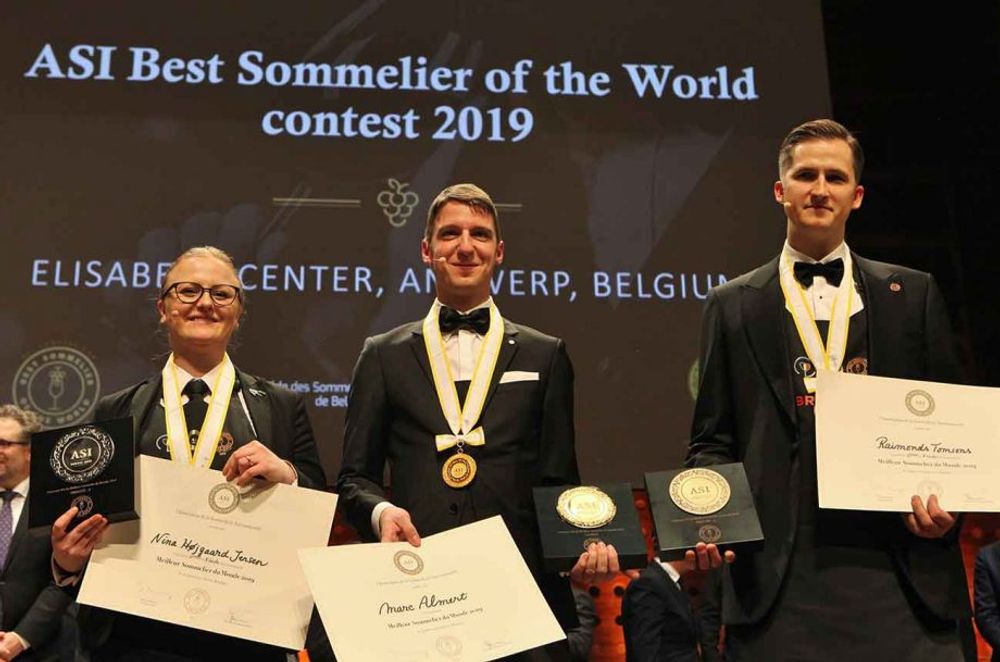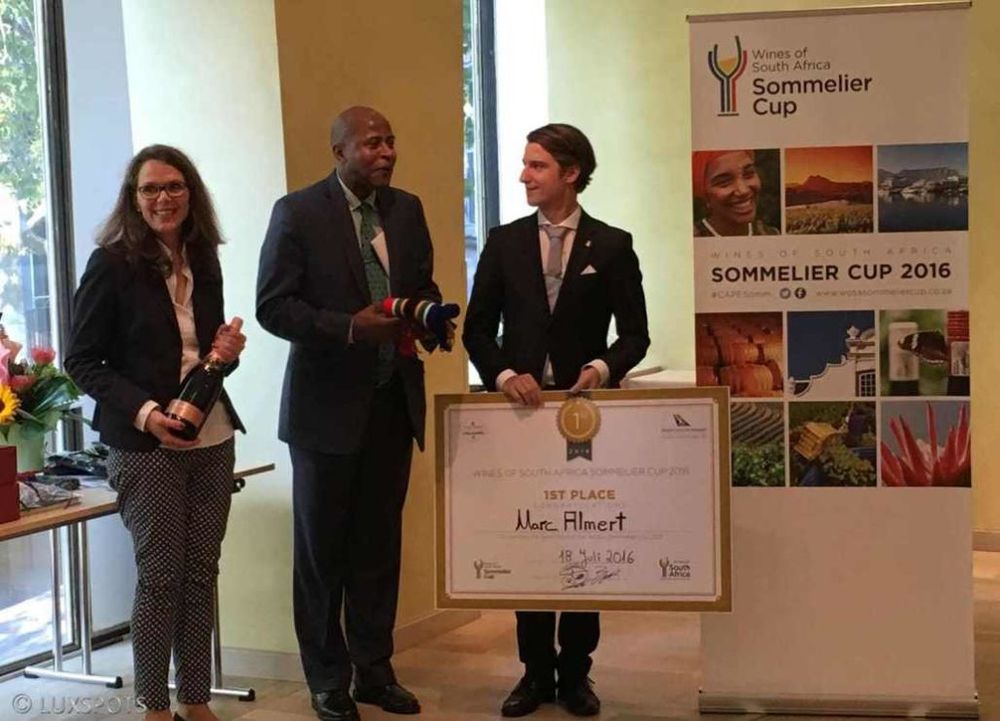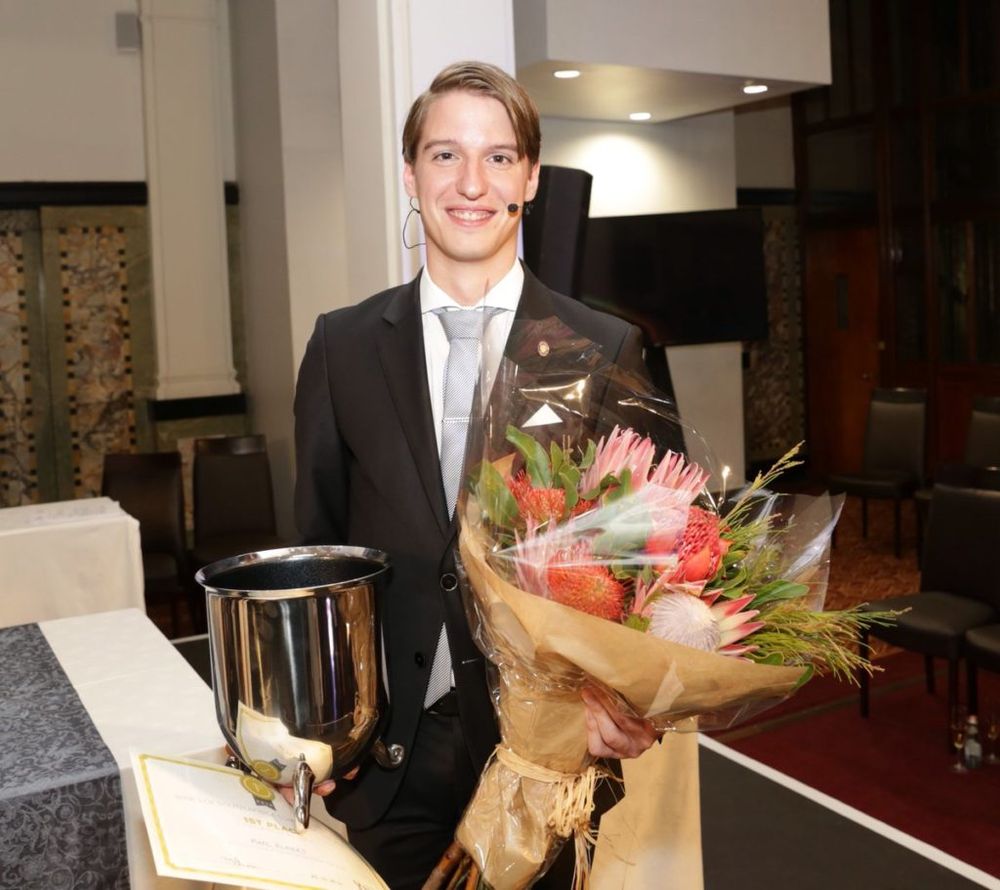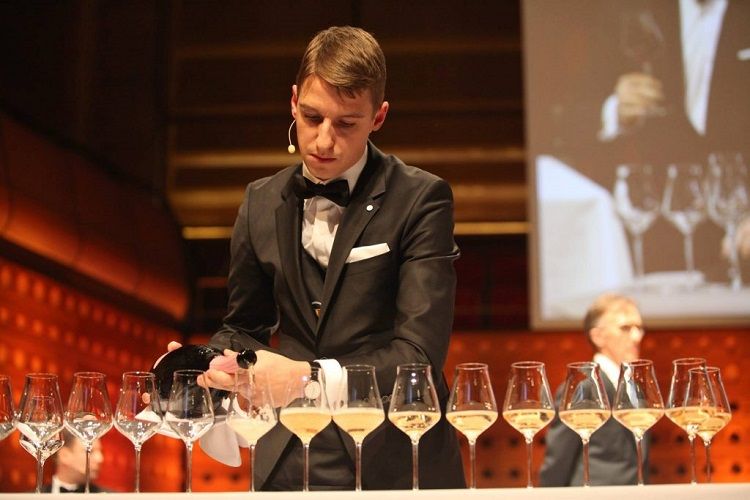What does it take to become the best sommelier in the world by the 2019 winner Marc Almert
If you have ever attended one of the major finals of an international sommelier competition then you wander how on earth the competing sommeliers can keep it together under such fierce scrutiny and pressure. For it is not like any other exam where you are left to your own devices with a table, chair, pen or pencil. No. You have to get up on stage in front of possibly hundreds of people and perform.
What’s more the people judging you are usually on the stage with you. Pretending to be casual diners sitting at tables waiting for you to serve them. But these casual diners also happen to be the most prestigious and eminent people in your field. Master Sommeliers and former Best Sommeliers in the world, all intent on putting you through your paces and exacting every bead of sweat that they once had to go through.

Marc Almert at the awards ceremony at the Best Sommelier in the World competition earlier this year
Welcome to the world of Marc Almert, who earlier this year jumped through every barrier possible to be named ASI Best Sommelier of the World 2019. At just 28. What makes his victory even more impressive is that he only actually started working in wine six years earlier.
Talking to him between service where he works at the Baur du Lac Hotel in Zurich.you sense he is still taking it all in. He is also very keen not to just rest on his laurels, but to use his award to do what he can to inspire and help other young sommeliers achieve their goals and desires.
One of his first assignments as the world’s best sommelier will come in September when he is part of the final judging team that will assess the finalists in Wines of South Africa’s Sommelier Cup competition. One of those sommeliers will come from the UK competition that takes place on June 10 at 67 Pall Mall (for which entries are still very much open until June 7. Click here for details).
It brings back happy memories for Almert, for he was the overall winner in the last Sommelier Cup competition held in 2016. “It was the first major competition I won,” he says.

Almert at the 2016 Sommelier Cup in Cape Town
Hospitality before wine
Almert says his passion for travel and discovering new and exciting countries came long before any interest in wine. It was that travel bug that encouraged him to try a career in hospitality and the chance to work in restaurants and hotels in different cities.
In fact he was more interested in being a hotel manager than a sommelier when he first started out. It was, though, whilst doing his hospitably training that he learnt about what it was like to work behind and manage a bar. Be it making cocktails, or managing the drinks list. Which, in turn, allowed him to take his first tentative steps into wine.
It was during his first job in a restaurant in Germany’s Rheingau in 2012 that he really started to discover and take more than just a keen interest in wine, initiated by the famous Rieslings of the area. “It was where I learnt how to be a sommelier,” says Almert. “I was surrounded by people who were so passionate about their wines.”
It was where he also quickly realised he had a natural skill when it came to tasting wine, and appreciating the different favours and smells and texture. He was certainly, he says, in the right region to learn. “I did not really have any formal training, it was more working in the restaurant and experiencing wine every day,” he adds.
He then moved to a two star Michelin restaurant in Hamburg, between 2014-2016, where he was able to combine his job with a new side career in entering – and mostly winning – sommelier competitions. It was during his time at Hamburg that he was able to bring in and try a wealth of imported wines, particularly from the New World.
Teamwork is key

Practice, practice and practice and key to becoming the world’s best sommelier, says Marc Almert
Although wine is clearly where his main career lies, he stresses, the wider skills he learnt doing his hospitality training has been invaluable in allowing him to achieve so much. “You have to learn so many different skills and work with other teams. You have to be good at adapting and being flexible,” he explains.
Skills, he says, he was able to use on the restaurant floor when working with other sommeliers and the front and back of house teams.
Experiences, he adds, that were also invaluable when he really stepped up training for sommelier competitions. Particularly when he joined up with other sommeliers in Germany and Switzerland at Somm’s 360 Boot Camps.
Victory in WOSA’s Sommelier Cup clearly spurred Almert on. In fact when he took part in the 2016 competition he was also competing in or about to take part in two other events at the same time. In 2017 he was named German Sommelier of the Year which sent him on his way to the ASI grand finals earlier this year.
Winning competitions
So what’s the secret to his success? Well, for those scouring through tomes of wine books and spending hours in the library you might want to look away. “Try and see competitions as fun. That’s the approach I have always taken. Don’t take them too seriously, but as a way to grow and learn as a sommelier. It’s also a great way to meet other talented sommeliers and of course all the judges and the various associations that host the events.
It also gives Almert the chance to travel and see the world at the same time. When he was competing, for example, in WOSA’s Sommelier Cup in 2016 it was the first time he had been to the country and seen the winelands. “These competitions give you the chance to do that,” he add. “It was such a great opportunity to go to Cape Town and I am looking forward to going back.”

Taking part in sommelier competitions allows you to see the world, says Almert, like Cape Town and WOSA’s Sommelier Cup
Almert’s time in South Africa was clearly worth more than just picking up his sommelier award. He has gone on to import and work with a number of producers. “It’s one of the most dynamic wine countries in the world. I find both the country and its wines fascinating. It has such a long history with wine and it is great to see winemakers re-discovering old vines and finding new ways to work with them,” he explains. It’s going to be so interesting to see where its wines go next.”
“There are so many different styles to discover, and regions, which makes such for a wide variety to choose from – at an interesting price point. There really is outstanding quality for the price.”
For those taking part in the Sommelier Cup it is important, he says, to read as much as you can about the country and its wines before you take part in the competition as the initial online test will soon pick out those who have not done their homework. “But is a really great way to learn more about South Africa, and its food and wine.”
“It’s a very tough competition and the judges are very thorough, particularly in the tasting and serve sections of the event which is also being live streamed around the world. So it can be intimidating but it is also great fun.”
He says he also used the Sommelier Cup as very much a learning process to help him enter other competitions. “The Sommelier Cup was the biggest competition I had taken part in, so just to get to the finals and take part in front of such high calibre judges was a big step for me.”
Advice for sommeliers

Marc Almert, who is now the ASI Best Sommelier of the World 2019, was the overall 2016 winner of Wine of South Africa’s Sommelier Cup
As for specific areas of advice? Almert says it is important to break the competition down into its separate parts and prepare equally for each. So the theory, the tasting and the service. “Oh, and taste everything you can.”
One area of preparation, he adds, that is often overlooked is the mental aspect of competing in such stressful conditions. Almert has spent a lot of time teaching himself and his body how to perform under extreme pressure. Key is breathing and knowing how to stay calm through breathing. Meditation also helps to focus and keep your concentration at key times.
“It is important to get a time plan for how you are going to prepare. Set out the different stages and what time you need for each. Then when it gets closer practice and keep on practising your tasting and service skills. That’s crucial.”
All of which needs time. “The biggest challenge is finding the time to prepare,” he says. Particularly when competing in the major competitions, like Best Sommelier of the World. “You have no idea of what is going to come up. You just have to learn your theory by heart. And taste.”
He says the Best Sommelier competition also expects you to be on top of your spirits, and other drinks. A key part of this year’s world competition, for example, was tasting beers, which for someone born and bred in Cologne was probably easier than for some others. “The finals were in Belgium, so I thought beer might come up and I had prepared a lot,” he says. “You also have to identify 10 spirits in three mintutes. Which is where I was able to use some of my bar training when doing my hospitality training.”
He says he has been particularly lucky over the years to have the support of the German Sommelier Association and then when building up to the major competitions, the help and guidance of Swesomm, the Swedish National Sommelier Team.
So what now for Almert? He insists he still has challenges to meet and aspire to. Most notably his desire to pass the Master Sommelier exam. “I am still young and want to learn. I may not compete as much in the future but I am looking forward to being part of the competitions, helping to judge and meet the other sommeliers. It can be a bit like a class reunion when we all meet up at different events. So it will be good to get to know the other side of competition as well.”
- If you would like to take part in the UK finals to decide which UK-based sommelier goes to the Sommelier Cup in Cape Town in September then click here for details on how to enter.






























